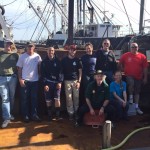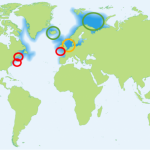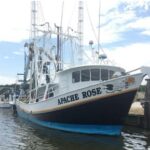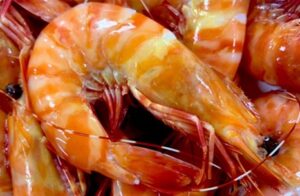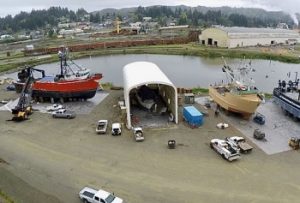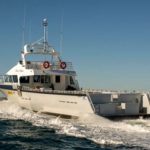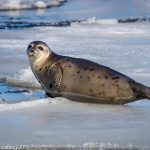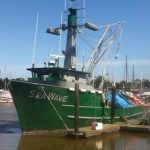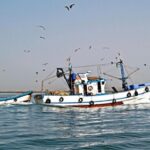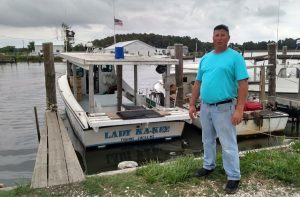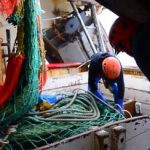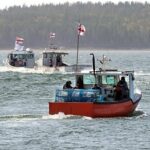Monthly Archives: April 2017
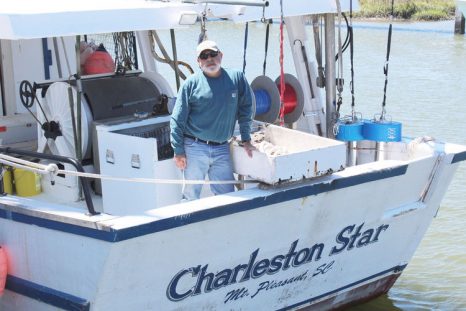
South Carolina: 30th on the 30th – Blessing of the Fleet marks start of shrimp season
The 30th annual Blessing of the Fleet will be held April 30 with an anticipated fleet of 13 boats. Continuing the tradition began by the Magwood family, who started the festival in 1988, every year the proceeds from the festival are donated to local nonprofit organizations. The Town of Mount Pleasant has chosen the Charleston Port and Seafarers’ Society and East Cooper Meals on Wheels to receive the net proceeds of the 30th annual Blessing of the Fleet & Seafood Festival. Meet the captains – click here to read the rest and view the images 15:28
Division of Marine Fisheries Extends Trap Fishing Gear Closure in Cape Cod Bay
 As a result of the ongoing presence of endangered right whales feeding in Cape Cod Bay, the Division of Marine Fisheries (DMF) today announced that most of Cape Cod Bay will remain closed to the setting of recreational and commercial traps and pots for an additional week, through May 7, 2017. Right whales are common in Cape Cod Bay during late winter and early spring, especially during the months of March and April, and usually depart before May 1, when the three month (February – April) trap closure affecting this area was scheduled to be lifted. However, over the past month an unprecedented number of whales have been observed, with mid-April counts demonstrating a presence of more than 200 whales. While the most recent survey suggests some whales may have departed the Bay, an estimated 100 to 200 individuals remain present. This late seasonal presence of whales corresponds with extraordinarily high densities of plankton (Calanus copepods), the preferred food of right whales. Read the press release here with imagery 14:43
As a result of the ongoing presence of endangered right whales feeding in Cape Cod Bay, the Division of Marine Fisheries (DMF) today announced that most of Cape Cod Bay will remain closed to the setting of recreational and commercial traps and pots for an additional week, through May 7, 2017. Right whales are common in Cape Cod Bay during late winter and early spring, especially during the months of March and April, and usually depart before May 1, when the three month (February – April) trap closure affecting this area was scheduled to be lifted. However, over the past month an unprecedented number of whales have been observed, with mid-April counts demonstrating a presence of more than 200 whales. While the most recent survey suggests some whales may have departed the Bay, an estimated 100 to 200 individuals remain present. This late seasonal presence of whales corresponds with extraordinarily high densities of plankton (Calanus copepods), the preferred food of right whales. Read the press release here with imagery 14:43
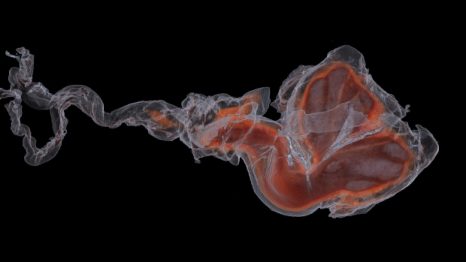
Researchers probing marine mammal genitals, copulation with simulated sex!
Dara Orbach is probably one of very few people in the world who regularly gets sent dolphin vaginas in the mail. “The boxes don’t usually smell very good when they arrive,” says Orbach, a post-doctoral fellow at Dalhousie University and a research assistant at Mount Holyoke College in Massachusetts. The marine mammologist has spent the last few years studying the genitals of whales, dolphins, porpoises, sea lions and seals to understand how they fit together during sex. It’s not an easy thing to do. First, she has to actually obtain the animals’ vaginas and penises. Orbach has a permit to receive the reproductive organs of marine mammals that have died of natural causes after a necropsy has taken place. It has taken her years, but at its peak, her collection included about 140 specimens. Second, she has to figure out how the penises and vaginas interact in real life when, in fact, they’re lying inert and disembodied on her laboratory table. click here to read this story 12:30

Kitty’s out of a job! Researchers Discontinue Annual Lobster Season Forecast After Complaints From Industry
A Portland-based research institute is dropping its yearly forecast of when lobster landings in Maine will begin their annual surge. The move comes after criticism from Maine’s lobster industry about the report’s timing and accuracy, and its effect on lobster prices.,, State regulators and lobster industry groups asked the institute whether it could develop a tool that would allow the timing of the annual uptick in lobster landings to be predicted. After a few years studying the issue, the institute started publicizing its statewide predictions in 2015 and again last year. But last year, and particularly in certain geographic areas, the prediction didn’t match conditions. click here to read the story 11:40
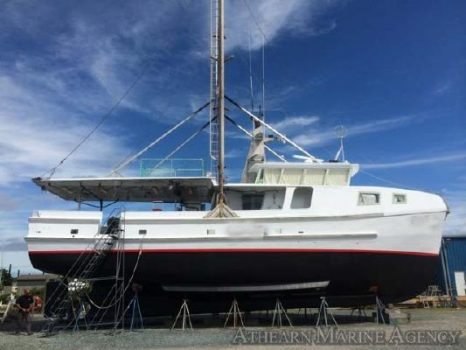
Athearn Marine Agency Boat of the Week: 65′ Fiberglass Longliner, Cummins 855TA, 40 KW Genset, Fed Permits available
Specifications, information and 7 (more being added) photo’s click here Swordfish Directed, Shark Directed, Atlantic Tuna Longline available for an additional cost. To see all the boats in this series, Click here 11:11
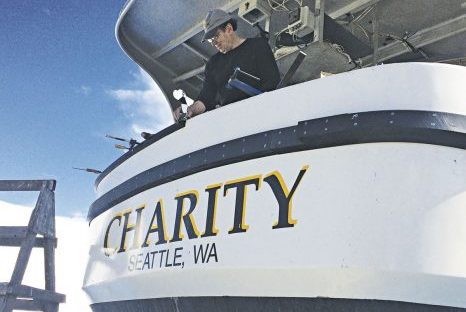
The Fishing Fleet: An invisible cornerstone of our economy
Hundreds of people who drive by on their way to and from wherever probably don’t notice, but you might, or at least you could. Look seaward when you pass Safeway and you’ll see a boatyard story that goes beyond the wooden boat identity Port Townsend is famous for. Below the tall masts of schooners and square riggers are the troll poles, gurdies and net rollers of the fish boats that call on Port Townsend for their winter’s maintenance. Some of their owners live here, and the vessels’ names are better known (Chichagof, Duna, Cape Cleare). Many come from distant ports, employing and trusting our community to keep their boats afloat. The marine trades constitute the third-largest employer in the county. This is big business for us. Tim Hoffman of Lowest Hadlock Shipwrights put this way: “Ninety percent of my business is fish boats, and they really don’t get the credit they deserve for what they’ve brought to this place, and I’m talking since the mid-’70s.” click here to read the story 08:51
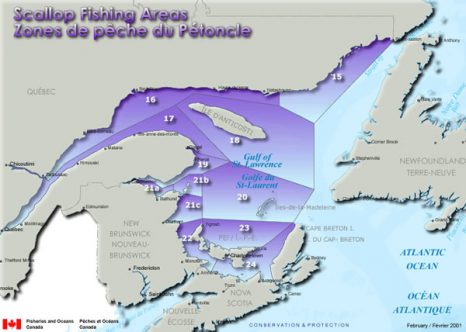
P.E.I. scallop fishermen propose temporary exclusion zone compensation go to rationalization
Prince Edward Island scallop fishermen are proposing the money Maritime Electric is promising as compensation be applied towards rationalization. The utility is offering $500,000 as compensation for keeping scallop fishermen out of part of their zone this year. The Department of Fisheries and Oceans has agreed to a request from Maritime Electric to impose a fishing exclusion zone across the Northumberland Strait off Borden where the utility is currently laying new submarine power cables. The area, which includes some of the best scallop fishing beds in Scallop Fishing Area 22, is expected to be in place for most of the month of May. The five-week scallop fishery opens May 1 and involves fishermen from both sides of the strait. Of the 130 license-holders in New Brunswick and 60 in P.E.I., about 60 to 70 of them are active each year. click here to read the rest. 21:23
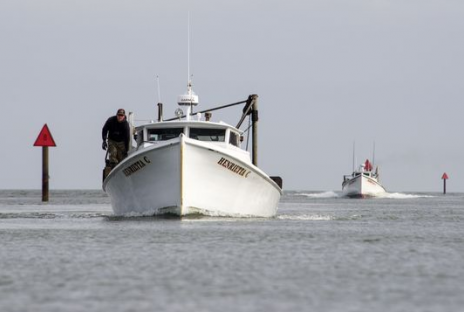
Coast Guard suspends search for missing Tangier waterman
A search for a missing Tangier Island waterman was suspended, a day after his boat sank 5 miles off the island throwing him and is son into the chilly waters of the Chesapeake Bay and devastating their small island community. There was still no sign of Ed Charnock when the search was halted around 10:30 a.m. Tuesday, said Petty Officer Berry Bena of Coast Guard Station Baltimore. “The whole island’s in mourning,” said Tangier Mayor James “Ooker” Eskridge, who called Charnock “a very likeable guy – very humble.” Charnock and his son, Jason, went overboard after broadcasting on marine radio that their 40-foot boat was taking on water around 2:30 p.m. Monday. Weather conditions were hazardous with high winds, rain and reduced visibility, but most watermen are used to working in those conditions, said Charnock’s brother-in-law, Dan Harrison of Crisfield. Charnock was a good waterman who took meticulous care of his boat, he said. Click here to read the story 16:50
Censored! No Media Allowed: FFAW Union Boss to meet with protesters but not interested in ‘spectacle’
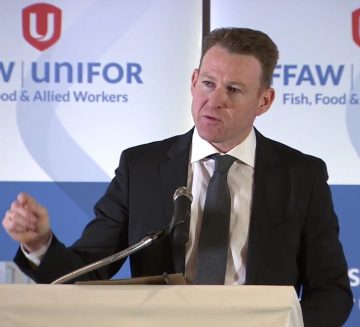 The Fish, Food and Allied Workers (FFAW) will meet with fish harvesters who protested outside the union building on Monday, but says media will not be allowed. “To have [media] in the meeting, and to really make something a spectacle is not really what we’re interested in,” Keith Sullivan, president of the FFAW, told CBC Radio’s St. John’s Morning Show. “Obviously [we’re] happy to meet with members, but to have a spectacle and something that’s only going to further embarrass our industry … we have no interest in doing that.”Protesters first rallied outside the Fisheries and Oceans Canada building where Richard Gillett — vice-president of the Federation of Independent Seafood Harvesters of Newfoundland and Labrador (FISH-NL) — held his 11-day hunger strike and headed to the offices of the FFAW on Monday. They demanded a meeting with the union, and that media be present during that meeting. click here to read the story 14:36
The Fish, Food and Allied Workers (FFAW) will meet with fish harvesters who protested outside the union building on Monday, but says media will not be allowed. “To have [media] in the meeting, and to really make something a spectacle is not really what we’re interested in,” Keith Sullivan, president of the FFAW, told CBC Radio’s St. John’s Morning Show. “Obviously [we’re] happy to meet with members, but to have a spectacle and something that’s only going to further embarrass our industry … we have no interest in doing that.”Protesters first rallied outside the Fisheries and Oceans Canada building where Richard Gillett — vice-president of the Federation of Independent Seafood Harvesters of Newfoundland and Labrador (FISH-NL) — held his 11-day hunger strike and headed to the offices of the FFAW on Monday. They demanded a meeting with the union, and that media be present during that meeting. click here to read the story 14:36
A protest that had the makings of turning ugly on Monday in St. John’s ended with handshakes between the fishermen fighting for their livelihoods and the police force charged with keeping public order and safety. Still, the fishermen drove away — back to home communities and boats scattered around the island — disappointed with not getting answers to a net load of questions. Fisherman Brent Adams from Marystown said the meeting should take place in the union building. “This is our building. We paid for this building. Why not meet here?” he said. “They (FFAW executive) should all resign.” click here to read the story and watch the video. 15:29
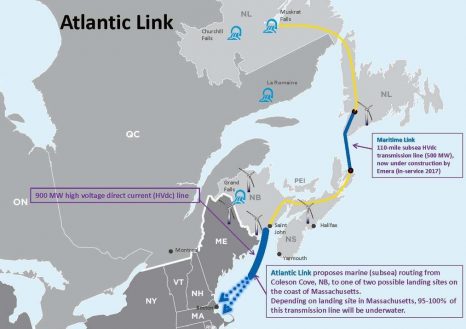
Maine fishermen could feel impact of proposed undersea cable
A Canadian company is proposing a 350-mile, sub-sea power transmission cable that could interfere with commercial fishing along the coast of Maine. If the project is approved, the Atlantic Link cable would be buried about 25 miles offshore of Harpswell, running between New Brunswick, Canada, and Plymouth, Massachusetts. It would affect about 400 lobstermen from Cape Elizabeth to Phippsburg, according to spokesman Gerald Weseen of the Nova Scotia-based energy services company Emera. Weseen and other project representatives, and staff from the Maine Coast Fishermen’s Association, conducted a meeting about the project April 21 that drew only two area lobstermen. click here to read the story 13:12
Meanwhile in the Straight of New Brunswick, Scallop fishermen worried about short- and long-term impact of electric cable installation. “Are we going to have a fishery there in the future, or are we going to have wait seven years to get it back up again?” Barlow asked. click here to read the story 14:20
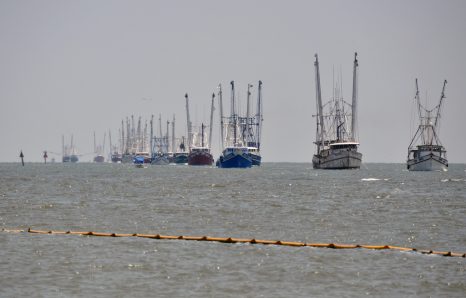
Lafourche fisherman sues BP, alleging injuries from oil spill cleanup
A man from Cut Off is suing BP, alleging he has suffered severe injuries since he was exposed to crude oil and dispersants while working in oil spill cleanup after the 2010 Deepwater Horizon explosion. Levy Brunet Jr. filed the lawsuit in U.S. District Court in New Orleans. He names BP PLC, BP Exploration and Production and BP America Production Co. as defendants. According to the lawsuit, the defendants chartered Brunet’s commercial fishing and shrimping boat in May 2010 for the Vessel of Opportunity Program to help with cleanup from Deepwater Horizon. The plaintiff worked in the program until October 2010.,, Brunet alleges he was exposed to “massive quantities of crude oil, crude oil vapors, dispersants that were being injected into the well site and/or sprayed onto the surface of the water, other gasses or chemicals being released by the uncontrolled well release, as well as fumes from the burning of all these materials, which caused the release of noxious fumes and/or particles.” click here to read the story 09:52
Capelin count: DFO spending $2.4M to study fishery ‘linchpin’
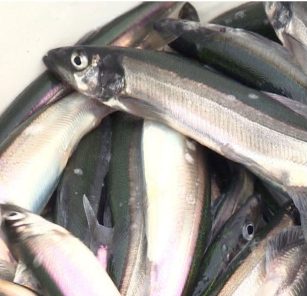 The Department of Fisheries and Oceans is spending more time and money on understanding why capelin stocks haven’t recovered. “Capelin are a linchpin; that’s the simplest I can put it. If you don’t have a lot of capelin, you don’t have a lot of other stuff,” senior researcher Pierre Pepin told reporters at a department briefing. Pepin said the success of other species depends on a healthy capelin population.,, It wasn’t just cod that collapsed in the early ’90s. Capelin stocks peaked at around six million tonnes before collapsing to next to nothing. Recent surveys show a small recovery to about one million tonnes. Scientists don’t know what caused the collapse, but it came during a period of very cold ocean temperatures. click here to read the story 09:30
The Department of Fisheries and Oceans is spending more time and money on understanding why capelin stocks haven’t recovered. “Capelin are a linchpin; that’s the simplest I can put it. If you don’t have a lot of capelin, you don’t have a lot of other stuff,” senior researcher Pierre Pepin told reporters at a department briefing. Pepin said the success of other species depends on a healthy capelin population.,, It wasn’t just cod that collapsed in the early ’90s. Capelin stocks peaked at around six million tonnes before collapsing to next to nothing. Recent surveys show a small recovery to about one million tonnes. Scientists don’t know what caused the collapse, but it came during a period of very cold ocean temperatures. click here to read the story 09:30
Maine Lobstermen tired of conflicts, support bill to allow secretly installed tracking devices
 Lobstermen fed up with cohorts who violate fishing regulations testified in favor of a bill to allow Marine Patrol officers to secretly install tracking devices on fishing vessels suspected of illegal activity without first obtaining a warrant. While a smaller faction opposed the bill, both sides agreed that Maine faces a growing “epidemic” posed by a small number of law-breakers fueling dangerous conflict and threatening the stewardship ethos within the state’s most valuable fishery. They also agreed that the Maine Department of Marine Resources needed more enforcement tools, but lobstermen differed on whether DMR’s commissioner should be allowed to authorize the installation of GPS tracking devices without getting a judge’s approval. click here to read the story 08:36
Lobstermen fed up with cohorts who violate fishing regulations testified in favor of a bill to allow Marine Patrol officers to secretly install tracking devices on fishing vessels suspected of illegal activity without first obtaining a warrant. While a smaller faction opposed the bill, both sides agreed that Maine faces a growing “epidemic” posed by a small number of law-breakers fueling dangerous conflict and threatening the stewardship ethos within the state’s most valuable fishery. They also agreed that the Maine Department of Marine Resources needed more enforcement tools, but lobstermen differed on whether DMR’s commissioner should be allowed to authorize the installation of GPS tracking devices without getting a judge’s approval. click here to read the story 08:36
1 man rescued as Coast Guard Searches for Missing Waterman off Tangier Island
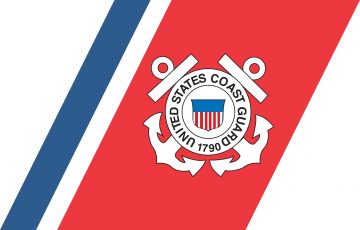 The Coast Guard says one waterman is still missing after a boat went down with two people on board. The Coast Guard says a distress signal was sent out around 2:30 p.m. Monday afternoon from a 40 foot crabbing boat about five miles off the coast of the island. The boat said it was taking on water, before communication was lost. Tangier Island Mayor James Eskridge says the men on board the boat were father and son. Eskridge says the men went into the water without life vests and “every able body waterman on Tangier” went to help search for the missing men. The Coast Guard says one of the men was rescued by a good samaritan, who Eskridge later said was the son. link The release from the USCG click here 07:40
The Coast Guard says one waterman is still missing after a boat went down with two people on board. The Coast Guard says a distress signal was sent out around 2:30 p.m. Monday afternoon from a 40 foot crabbing boat about five miles off the coast of the island. The boat said it was taking on water, before communication was lost. Tangier Island Mayor James Eskridge says the men on board the boat were father and son. Eskridge says the men went into the water without life vests and “every able body waterman on Tangier” went to help search for the missing men. The Coast Guard says one of the men was rescued by a good samaritan, who Eskridge later said was the son. link The release from the USCG click here 07:40
Former ‘Deadliest Catch’ star Jake Harris arrested for car theft, drug possession
 Ex-“Deadliest Catch” star Jake Harris is in a sea of trouble. The former reality star was arrested over the weekend after allegedly stealing a car and for drug possession, according to TMZ. Harris, 31, reportedly drove from Washington to Phoenix with an unidentified married woman, then took off with her car Friday morning, according to the gossip website. Phoenix police reportedly found Harris at a Circle K on Saturday with Xanax and crystal meth. Harris was charged with one count of theft, one count of dangerous drug possession and one count of prescription drug possession, according to the Maricopa County Sheriff’s Office. Link (It doesn’t even look like the same guy. Drug’s destroy everything good.)
Ex-“Deadliest Catch” star Jake Harris is in a sea of trouble. The former reality star was arrested over the weekend after allegedly stealing a car and for drug possession, according to TMZ. Harris, 31, reportedly drove from Washington to Phoenix with an unidentified married woman, then took off with her car Friday morning, according to the gossip website. Phoenix police reportedly found Harris at a Circle K on Saturday with Xanax and crystal meth. Harris was charged with one count of theft, one count of dangerous drug possession and one count of prescription drug possession, according to the Maricopa County Sheriff’s Office. Link (It doesn’t even look like the same guy. Drug’s destroy everything good.)
Scientists don’t need to do a better job of explaining themselves to fishermen — they need to do a better job of listening to them.
 There’s currently a public spotlight on the plight faced by the province’s inshore fishers, due in part to the courageous 11-day hunger strike of FISH-NL Vice-President Richard Gillett that ended Sunday with his hospitalization, and to the increasing militancy on the part of desperate fishers, who have stormed, occupied, and barricaded Department of Fisheries and Oceans (DFO) offices, burned their gear in public protest, and spoken out in myriad ways about the crisis they and their communities face.,, Their protests have provoked a range of responses, some of which are incredibly counter-productive. For instance, the suggestion that scientists need to do a better job of explaining their science to fishers.,, The implication is that if fishers actually understood the science, they would stop protesting — which misses the entire point of these protests on two counts. click here to read the article 17:45
There’s currently a public spotlight on the plight faced by the province’s inshore fishers, due in part to the courageous 11-day hunger strike of FISH-NL Vice-President Richard Gillett that ended Sunday with his hospitalization, and to the increasing militancy on the part of desperate fishers, who have stormed, occupied, and barricaded Department of Fisheries and Oceans (DFO) offices, burned their gear in public protest, and spoken out in myriad ways about the crisis they and their communities face.,, Their protests have provoked a range of responses, some of which are incredibly counter-productive. For instance, the suggestion that scientists need to do a better job of explaining their science to fishers.,, The implication is that if fishers actually understood the science, they would stop protesting — which misses the entire point of these protests on two counts. click here to read the article 17:45
Former Obama Official: Bureaucrats Manipulate Climate Stats To Influence Policy
 A former member of the Obama administration claims Washington D.C. often uses “misleading” news releases about climate data to influence public opinion. Former Energy Department Undersecretary Steven Koonin told The Wall Street Journal Monday that bureaucrats within former President Barack Obama’s administration spun scientific data to manipulate public opinion. “What you saw coming out of the press releases about climate data, climate analysis, was, I’d say, misleading, sometimes just wrong,” Koonin said, referring to elements within the Obama administration he said were responsible for manipulating climate data.,, Press officers work with scientists within agencies like the National Oceanic Administration (NOAA) and NASA and are responsible for crafting misleading press releases on climate, he added. Koonin is not the only one claiming wrongdoing. House lawmakers with the Committee on Science, Space and Technology, for instance, recently jumpstarted an investigation into NOAA after a whistleblower said agency scientists rushed a landmark global warming study to influence policymakers. Click here to read the rest, and click here to watch the video 16:06
A former member of the Obama administration claims Washington D.C. often uses “misleading” news releases about climate data to influence public opinion. Former Energy Department Undersecretary Steven Koonin told The Wall Street Journal Monday that bureaucrats within former President Barack Obama’s administration spun scientific data to manipulate public opinion. “What you saw coming out of the press releases about climate data, climate analysis, was, I’d say, misleading, sometimes just wrong,” Koonin said, referring to elements within the Obama administration he said were responsible for manipulating climate data.,, Press officers work with scientists within agencies like the National Oceanic Administration (NOAA) and NASA and are responsible for crafting misleading press releases on climate, he added. Koonin is not the only one claiming wrongdoing. House lawmakers with the Committee on Science, Space and Technology, for instance, recently jumpstarted an investigation into NOAA after a whistleblower said agency scientists rushed a landmark global warming study to influence policymakers. Click here to read the rest, and click here to watch the video 16:06
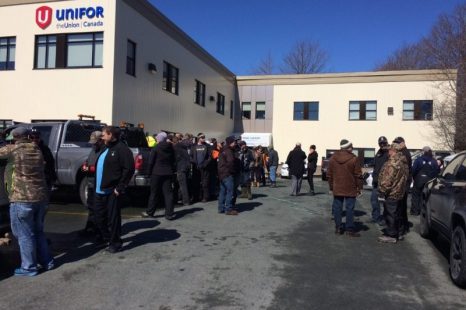
FFAW – Statement on Fish Harvester Protest in front of their building.
FFAW’s Executive Board understands and agrees that this is a difficult time in the fishery. The fishery is in transition which creates uncertainty. FFAW has worked hard to help ease the difficulties created by changes in the marine environment. We are in daily communication with DFO on improving quotas, on finding a better approach to assessing fisheries science, and on ensuring that the voice of harvesters is clearly heard in matters of fisheries management. We have dozens of elected committees throughout the province engaged with DFO on a wide variety of issues. Over the past six months, these committees, in conjunction with FFAW staff, have conducted hundreds of meetings in communities across the province. We are engaged and the vast majority of our membership understand the support we provide and results we achieve. continue reading the press release, click here 15:29
Lobster — Smoke That!
 You may be familiar with smoked salmon and smoked trout. But Robert Young wants you to get to know smoked Maine lobster. His Vinalhaven Smoked Lobster company is named for Vinalhaven, a small island 12 miles off the coast of Maine, where Young fishes. For the past decade, he’s been catching fresh lobsters aboard his boat, then steaming them, before extracting the meat to smoke over either cherry or hickory chips. The flesh is then either preserved in oil or turned into a lusty dip. What is smoked lobster like? It’s denser in texture than just steamed or boiled lobster. And it doesn’t flake like smoked fish does. Instead, the bite-size morsels are firm with a chew to them. The taste is sweeter than smoked fish, too. The cherry wood smoked lobster is more delicate tasting, accentuating the inherent sweetness of the mollusk, while the hickory-smoked lobster is much more full-on smoky, savory tasting. click here to read the story 14:53
You may be familiar with smoked salmon and smoked trout. But Robert Young wants you to get to know smoked Maine lobster. His Vinalhaven Smoked Lobster company is named for Vinalhaven, a small island 12 miles off the coast of Maine, where Young fishes. For the past decade, he’s been catching fresh lobsters aboard his boat, then steaming them, before extracting the meat to smoke over either cherry or hickory chips. The flesh is then either preserved in oil or turned into a lusty dip. What is smoked lobster like? It’s denser in texture than just steamed or boiled lobster. And it doesn’t flake like smoked fish does. Instead, the bite-size morsels are firm with a chew to them. The taste is sweeter than smoked fish, too. The cherry wood smoked lobster is more delicate tasting, accentuating the inherent sweetness of the mollusk, while the hickory-smoked lobster is much more full-on smoky, savory tasting. click here to read the story 14:53
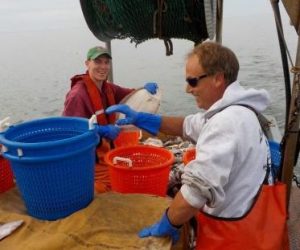
8 Things the Northeast Fisheries Observer Program Does for You!
Some of the largest, most profitable fisheries rely on fishery observers to collect, process and manage data and biological samples from commercial fishing trips for stock assessment and management purposes. But, that’s not all they do. Here’s a small behind the scenes look at some of the other things Northeast Fisheries Observer Program (NEFOP) observers do that directly or indirectly impact you, your family and friends, your wallet, your lifestyle, your community and more. click here to read the story. 13:02

Happening Now – Protestors on scene at FFAW building in St. John’s
A large group of fishermen are on the scene the Fish, Food and Allied Workers (FFAW) union offices in St. John’s this morning looking for a meeting, while the police riot squad has assembled nearby in case the gathering turns violent. About 30 fish harvesters are protesting in front of the Fish Food and Allied Workers union office this morning over what they say is a failure to relay their concerns to Ottawa. Shortly after 12:30 p.m., RNC Supt. Joe Boland informed the fishermen that the FFAW is holding a conference call with its executive to determine if they will meet with the fisherman. If so meeting will likely go ahead around 2 p.m. today. click here to read the story 11:30
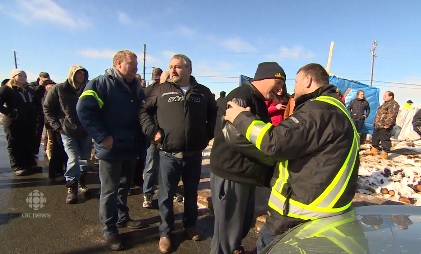
The Heat is On! Fishermen move protest to FFAW building after Richard Gillett addressed supporters outside DFO
Demonstrating fishermen have moved their protest from the Department of Fisheries and Oceans to the Fish, Food and Allied Workers (FFAW) building in St. John’. About 60 fishermen gathered outside the FFAW Monday morning asking for a meeting with the union. “We want a meeting with Bill Broderick, John Boland, Keith Sullivan and Dave Decker. The fishermen [are] fed up with the union here. Our voices are not getting to Ottawa,” said Rod Rowe, a fisherman from Fogo who has been fishing more than 30 years. “You all watched Richard Gillett starve himself. What did Ottawa do? What did our union do? What did our provincial government do? Absolutely nothing. They were willing to let him die. We’re not going to sit down and die either.” click here to see more images and video, read the story. 10:23
Seafood groups praise Trump’s “Buy American” executive order
 President Donald Trump’s “Buy American, Hire American” Executive Order has been positively received by some U.S. seafood trade groups, who say it will help the domestic seafood industry. Representatives of industry groups in Alaska and the U.S. states on the Gulf of Mexico said the executive order will help them create jobs for Americans.“In order to promote economic and national security and to help stimulate economic growth, create good jobs at decent wages, strengthen our middle class, and support the American manufacturing and defense industrial bases, it shall be the policy of the executive branch to maximize…through terms and conditions of federal financial assistance awards and federal procurements, the use of goods, products, and materials produced in the United States,” the order states. click here to read the story 09:58
President Donald Trump’s “Buy American, Hire American” Executive Order has been positively received by some U.S. seafood trade groups, who say it will help the domestic seafood industry. Representatives of industry groups in Alaska and the U.S. states on the Gulf of Mexico said the executive order will help them create jobs for Americans.“In order to promote economic and national security and to help stimulate economic growth, create good jobs at decent wages, strengthen our middle class, and support the American manufacturing and defense industrial bases, it shall be the policy of the executive branch to maximize…through terms and conditions of federal financial assistance awards and federal procurements, the use of goods, products, and materials produced in the United States,” the order states. click here to read the story 09:58
US warns threat of an export ban over continued killing of seals by Scots fish farms
 Ministers have received a warning about the continued shooting of seals by fish farms as the US poses the threat of an export ban which could cost the Scottish economy £200 million a year. New figures reveal that despite the salmon industry giving a “clear intention” to cut the number of seals shot to zero, fish farms and fisheries were continuing to kill them at a rate of over eight a month last year, under licence from the Scottish Government. The details have angered protesters who are concerned that that instead of finding alternative ways to deal with seals, fish farms are continuing to be content to shoot to kill. The US is now requiring proof that its seafood imports are harvested in a way that minimises harm to marine mammals. Later this year, the US is expected to release a country-by-country list of fisheries deemed acceptable and those deemed non-compliant. continue reading the story here 09:31
Ministers have received a warning about the continued shooting of seals by fish farms as the US poses the threat of an export ban which could cost the Scottish economy £200 million a year. New figures reveal that despite the salmon industry giving a “clear intention” to cut the number of seals shot to zero, fish farms and fisheries were continuing to kill them at a rate of over eight a month last year, under licence from the Scottish Government. The details have angered protesters who are concerned that that instead of finding alternative ways to deal with seals, fish farms are continuing to be content to shoot to kill. The US is now requiring proof that its seafood imports are harvested in a way that minimises harm to marine mammals. Later this year, the US is expected to release a country-by-country list of fisheries deemed acceptable and those deemed non-compliant. continue reading the story here 09:31
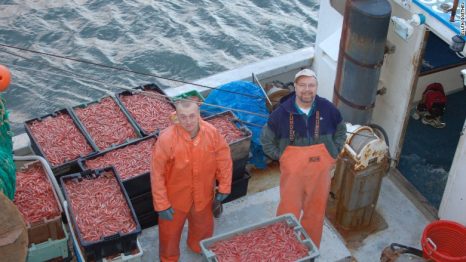
No shrimp today: Maine’s waters are warming and it’s costing fishermen money
David Goethel wishes he could retire. At 63, he’s been fishing off the Gulf of Maine for over 34 years. Shrimp used to be plentiful there. Back in 2000, Goethel remembers seeing 100 commercial boats out in the harbor. Now, he’s just one of a handful of local fisherman struggling to make a living. “There was life on the docks, there were people working,” lifelong fisherman Arnold Gamage, 64, agrees. “Now, it looks like a ghost town.” Maine’s fishing industry has been declining for years due to factors like overfishing and increased regulation, but there’s another culprit eating away at profits: Maine’s ocean waters are warming — and it’s killing northern shrimp. Why is the Gulf of Maine warming? Scientists aren’t certain, but Appelman and other experts suspect climate change is playing a role.,, Shrimping used to account for around 30% of Goethel’s income. While he recognizes that the ban is necessary, he still misses that extra cash. Lifelong fisherman Gary Libby is also feeling the squeeze. He’s been trying to sell his shrimp boat but no one is buying. He’s lost between 30% to 40% of his annual income since the ban was instituted. click here to read the story 08:52
Fresh and Local: Community seafood program lure customers with fresh catch
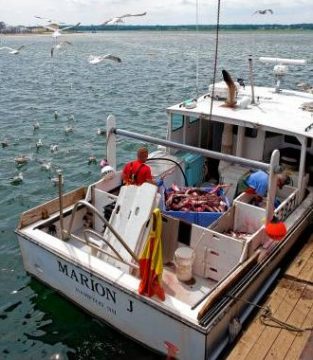 The return of warm weather is sending commercial fishing boats back out into the ocean and re-awakening the growing local seafood movement, which seeks to help small fishermen, just as the local food movement has helped small farms. “Fishermen are facing many problems and this isn’t the only answer, but it helps,” said Erik Chapman, acting director of the N.H. Sea Grant program at the University of New Hampshire and a cofounder of LocalCatch.org, which coordinates hundreds of direct-to-consumer seafood operations around the world.,, This year, N.H. Community Seafood is adding some fish caught commercially on rod and reel as well as those caught by nets used by commercial dayboats, and is incorporating some oysters and lobsters along with groundfish species such as cod, haddock and flounder, plus less-known species such as hake and dogfish (which is sometimes called cape shark to increase its consumer appeal). click here to read the story 18:09
The return of warm weather is sending commercial fishing boats back out into the ocean and re-awakening the growing local seafood movement, which seeks to help small fishermen, just as the local food movement has helped small farms. “Fishermen are facing many problems and this isn’t the only answer, but it helps,” said Erik Chapman, acting director of the N.H. Sea Grant program at the University of New Hampshire and a cofounder of LocalCatch.org, which coordinates hundreds of direct-to-consumer seafood operations around the world.,, This year, N.H. Community Seafood is adding some fish caught commercially on rod and reel as well as those caught by nets used by commercial dayboats, and is incorporating some oysters and lobsters along with groundfish species such as cod, haddock and flounder, plus less-known species such as hake and dogfish (which is sometimes called cape shark to increase its consumer appeal). click here to read the story 18:09
Animal rights industry never has to take bait
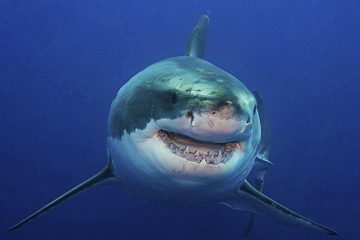 A few years ago my wife and I took two of my boys to the Northern Territory and were lucky enough to be given extensive access to the Tiwi Islands by the local land council. It was a rare privilege and I learnt much, but the thing I did not expect to learn had nothing to do with the culture of the local Tiwi Islanders at Bathurst and Melville Islands or the progress they were making at Tiwi College. What stuck with me were the photographs on the walls of the Barramundi Lodge showing World War II GIs, in the hundreds, swimming during shore leave. Today the waters of the Tiwi Islands are so infested with saltwater crocodiles that the Aboriginal kids we met would not dare swim beyond knee deep at their pristine beach. Across the NT coastline and in most of the Top End’s saltwater rivers, swimming is strictly off the agenda. Croc watching is big tourism business and crocs make great copy for the local newspaper, the NT News. But as the Tiwi elders told us, it was not always this way. In the days when crocodiles were hunted for food by the Tiwis and for skins by white hunters, it was not nearly so dangerous to enjoy the tropical waters of the Territory. Croc hunting was banned in the Territory in 1964, in Western Australia in 1962 and in Queensland in 1974. Populations have boomed and croc distributions widened dramatically since. So it is with sharks today. click here to read the article. 14:16 Sadly, the link redirects to subscribe. It worked earlier. This shark article explains the sharks today problem. ‘There’s no shark increase’: Fisheries minister ignores Federal government’s call for cull click here to read the story 20:14
A few years ago my wife and I took two of my boys to the Northern Territory and were lucky enough to be given extensive access to the Tiwi Islands by the local land council. It was a rare privilege and I learnt much, but the thing I did not expect to learn had nothing to do with the culture of the local Tiwi Islanders at Bathurst and Melville Islands or the progress they were making at Tiwi College. What stuck with me were the photographs on the walls of the Barramundi Lodge showing World War II GIs, in the hundreds, swimming during shore leave. Today the waters of the Tiwi Islands are so infested with saltwater crocodiles that the Aboriginal kids we met would not dare swim beyond knee deep at their pristine beach. Across the NT coastline and in most of the Top End’s saltwater rivers, swimming is strictly off the agenda. Croc watching is big tourism business and crocs make great copy for the local newspaper, the NT News. But as the Tiwi elders told us, it was not always this way. In the days when crocodiles were hunted for food by the Tiwis and for skins by white hunters, it was not nearly so dangerous to enjoy the tropical waters of the Territory. Croc hunting was banned in the Territory in 1964, in Western Australia in 1962 and in Queensland in 1974. Populations have boomed and croc distributions widened dramatically since. So it is with sharks today. click here to read the article. 14:16 Sadly, the link redirects to subscribe. It worked earlier. This shark article explains the sharks today problem. ‘There’s no shark increase’: Fisheries minister ignores Federal government’s call for cull click here to read the story 20:14 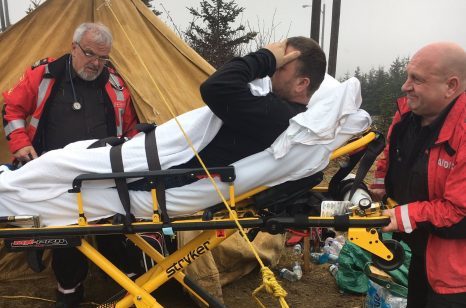
Hunger Strike: Day 11 – Canadian Fisherman Richard Gillett taken from protest site in ambulance
Richard Gillett, on a hunger strike in front of the Department of Fisheries and Oceans building in St. John’s, has been taken off site in an ambulance. Gillett, a fisherman and vice-president of the Federation of Independent Seafood Harvesters of Newfoundland and Labrador (FISH-NL), is in the 11th day of a hunger strike. Supporters applauded Gillett as paramedics took him from his tent on a stretcher and loaded him into the back of a waiting ambulance. Richard’s wife Joyce made the call to the ambulance. His father, John, said, “I got my son back.” He told CBC he didn’t want his son to embark on the hunger strike, but added, “He’s got his own conviction.” link 13:39 Ambulance takes hunger striking fisherman to hospital – Click here to read the story 13:44
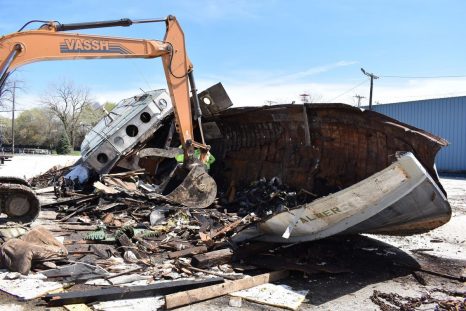
Historic Great Lakes fishing tug Palmer dismantled at former Azarian Marina
A crew from Vassh Excavating and Grading began work Friday to dismantle the historic Palmer, a 90-year-old commercial fishing boat. The Great Lakes fishing tug was carved out of the ice on the Root River in January after the boat sank at its slip at the Pugh Marina in late December near the State Street Bridge. The crew began work to demolish the 47-foot long, 13-foot-wide Palmer by hauling debris out of the boat. After they complete their work, only the metal shell of the Palmer will remain. Once all the boat’s debris has been removed, the shell will be hauled from the former Azarian Marina site off Water Street. When demolishing the boat, Vassh’s crew began to uncover a treasure trove of historic items, including three steering wheels in nearly perfect condition, eight porthole windows, a lamp from 1896, various old wood carvings and books from the 1920s. They also located the original 1926 lights, a Case motor and Twin Disc transmission. click here to see images, video, and read the story 13:24
“The Queensland government’s response is a f—ing joke,” – Fishers furious over delayed warning of toxic foam spill
 Fishers are furious they weren’t warned for days about a toxic foam spill in Brisbane waters, saying hundreds of kilograms of prawns were caught in the affected area. On the night of Monday, April 10, 22,000 litres of firefighting foam containing potentially harmful chemicals was released from a Brisbane Airport Qantas hangar, with some likely making it into the water in the lower reaches of the Brisbane River and killing about 20 fish. Queensland Environment Minister Steven Miles admitted his department knew of the spill by the following day but did not alert the public until Good Friday, when many people were disengaged with the news. He warned against eating seafood caught in the affected zone – from Bulimba Creek to Fisherman Island and north to Shorncliffe – but said this was outside commercial fishing areas. Trawler Michael Wilkinson said the T5 trawl fishing zone he and more than 30 others were licensed to fish entirely overlapped the affected area. “The Queensland government’s response is a f—ing joke,” he said, saying fishers should have been warned out of the area as soon as the spill occurred. click here to read the story 12:11
Fishers are furious they weren’t warned for days about a toxic foam spill in Brisbane waters, saying hundreds of kilograms of prawns were caught in the affected area. On the night of Monday, April 10, 22,000 litres of firefighting foam containing potentially harmful chemicals was released from a Brisbane Airport Qantas hangar, with some likely making it into the water in the lower reaches of the Brisbane River and killing about 20 fish. Queensland Environment Minister Steven Miles admitted his department knew of the spill by the following day but did not alert the public until Good Friday, when many people were disengaged with the news. He warned against eating seafood caught in the affected zone – from Bulimba Creek to Fisherman Island and north to Shorncliffe – but said this was outside commercial fishing areas. Trawler Michael Wilkinson said the T5 trawl fishing zone he and more than 30 others were licensed to fish entirely overlapped the affected area. “The Queensland government’s response is a f—ing joke,” he said, saying fishers should have been warned out of the area as soon as the spill occurred. click here to read the story 12:11

































